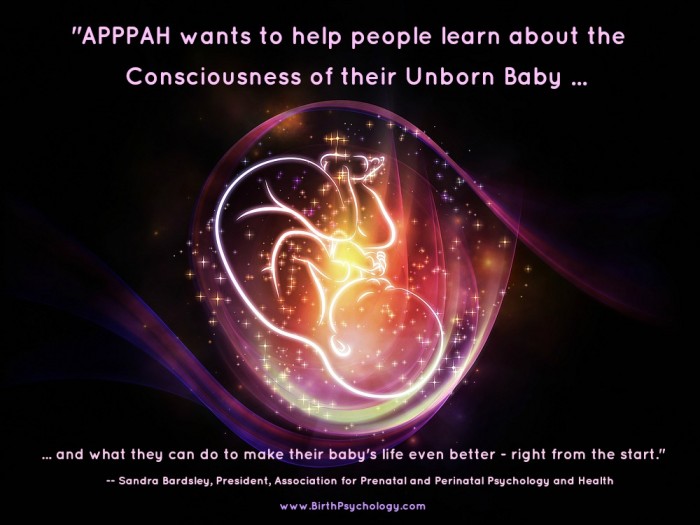Bringing Birth Psychology Into The World: An Interview With APPPAH President, Sandra Bardsley
Find more inspirational quotes and graphics on Kindred’s Pinterest page.
About the Interview
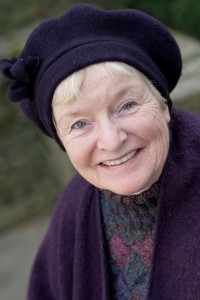
Sandra Bardsley, president of the venerable Association for Prenatal and Perinatal Psychology and Health, shares insights and overviews of APPPAH’s 30 year history and their groundbreaking outreach programs for parents and professionals. In the past three decades, multiple fields of science have emerged to support APPPAH’s original premise of the formation of human consciousness prenatally, the impact of pregnancy on neurodevelopment and the sentience of babies. As Bardsley and Lisa Reagan discuss, this emerging paradigm supports the possibility of healing and wholeness in humans – at any age.
Visit APPPAH at www.birthpsychology.com and their new educational program for parents and professionals at www.birthpsychologyedu.com.
APPPAH is a Pioneering Partner with Kindred Magazine and Community. Read more about birth psychology from Kate White, APPPAH’s educational director and contributing editor to Kindred, here.
View Kindred’s Birth Psychology playlist on YouTube here.
Listen to Kindred’s Fireside Chat with APPPAH President, Sandra Bardsley:
Bringing Birth Psychology Into The World: An Interview With APPPAH President, Sandra Bardsley
An Edited Transcript
LISA REAGAN: Welcome to Kindred’s fireside chats. This is Lisa Reagan and today I am speaking with Sandra Bardsley, who is the current president of the venerable Association for Prenatal and Perinatal Psychology and Health, also known at APPPAH. You can visit them online at birthpsychology.com. Welcome and thank you so much for talking with us.
SANDRA BARDSLEY: And thank you for having me, Lisa. It is wonderful to be here.
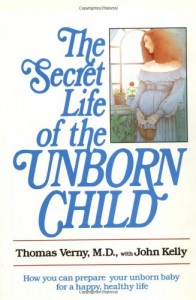
LISA REAGAN: So 30 years.
SANDRA BARDSLEY: Yes.
LISA REAGAN: APPPAH has been around for 30 years just now the science is catching up with APPPAH.
SANDRA BARDSLEY: Yes, that is kind of how it has been. In fact, I have a funny story about that. My 15-year-old son came into the kitchen and Shirley MacLaine had just put out her book Out on a Limb. It was sometime during that time, probably 20 years ago or so. But he came into the kitchen and he said to me, “Mom, you know this birth psychology stuff that you’re working on all the time?” I said, “Yes.” And he said, “Well, you are further out on a limb than Shirley MacLaine ever thought of going.”
LISA REAGAN: Oh my gosh.
SANDRA BARDSLEY: And I had a pretty good laugh at that. Because back then, Lisa, we did not have any of these things. We did not have ultrasounds and we did not have any way that we could prove what wonderful pioneers in our work, Thomas Gurney and David Chamberlain, Stan Grof, Fred Lake, different people that were working on these things and trying to prove that babies are conscious and sensuous beings and that how we treat the mother affects the baby tremendously and that some of our birth practices were very very harmful to the baby. So we’ve been working on that for 30 years.
When Time magazine came out, I believe that was probably in 2010 and started working and showing people that the baby has consciousness and that many of the fetal origins that are effecting lives of people have to do with the fact that the baby is receiving an imprint during its early gestation. So, yes, science is catching up so to speak and we are very grateful. Now we are discovering so many things and so we have finally have science behind us. We are dealing with it and we want to continue dealing with psychology and how the imprint that we carry has affected us, not only biologically and physically, but also psychologically as we go through our life.
LISA REAGAN: In talking with many researchers, pioneers and authors who are trying to tell this new story, I feel like the challenge in bringing the message forward is that so many people will miss the context and the metapicture and go right to the personal and feel like, “Oh no, I did something wrong to my child. Something was done wrong to me. Are you saying that I am broken or damaged?” So this is where, I feel like the challenge is to bring the good news to parents and to help them to hear that part.
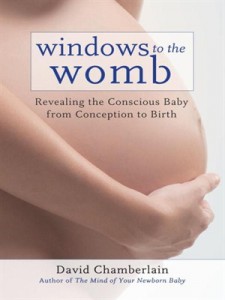
SANDRA BARDSLEY: Absolutely. You know, Lisa, APPPAH had its 30th birthday this last year when we had our international congress and we as the board were thinking, alright, so there has been a strong foundation laid, but now where do we want APPPAH to go from here? Basically speaking, the most important thing for us is that we want the message carried out to parents to be useful to them, not to be negative and fearful and I’ve done something wrong and I’m doing something wrong and my baby is going to be harmed or I was harmed. Yes, there are many practitioners coming forward now that are working in birth psychology that are helping people who do have severe trauma that they are working through. But we want to help people and especially young parents, millennials, as I’m calling them, we want to help them to prevent a lot of trauma for their babies and to have wonderful experiences with their baby.
You know, when I was having children, and I’m in my 70s, and when I was having children, we were not even taught about the consciousness of our unborn baby. Most of us, of course, I guess I would call it, who are enlightened a bit, we as mothers felt it and would be contact with our babies, but a lot of times we did not know anything and I can remember even being told that you don’t really even have a conscious baby. It’s a clean slate. We don’t have a baby who knows anything and you don’t really need to start teaching the baby until it is about a year old.
Well, now we know through science and what’s going on with social epigenetics and the studies, we know that baby’s brain is developing in utero and is wired together. So that those statements are important for us as young people and parents to know. It is true that a lot of times that we have to go through a lot of cathartic and difficult times to overcome our original shock, but a lot of people do not have that horrible shock and I even notice that my own children and grandchildren there is not that shock there. That is what APPPAH is wanting to do now, is to help people be educated and learn about the consciousness of their unborn baby and what they can do to make their baby’s life even better right from the start.
LISA REAGAN: So talk to me about neuroplasticity and what that new science has brought to the idea of prenatal and perinatal consciousness and our innate ability, even tendency, to heal and return to wholeness.
SANDRA BARDSLEY: We know that with neuroplasticity the brain is forever learning and it is forever changing. Built into the system of nature is a healing component and you can call it neuroplasticity. It is a way that the brain and the whole being, the consciousness of the individual and their experiences in life can heal and make new pathways. The neurons that are firing in the brain, some of them do not get wired together and then later, an experience will come into your life that will change the wiring and that is the plasticity of the brain that means the brain can constantly be renewing itself.
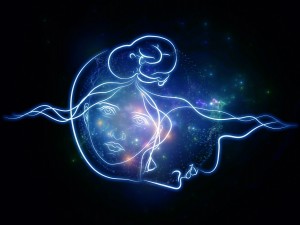
So with the neuroplasticity concept, we are talking now about a process of weaving the effective neuro sciences and the interpersonal biology into our understanding of human development. Yes, it has taken decades, but we are getting a full round picture of what babies experience now, as well as what they are capable of and there are wonderful infant laboratories now and researchers that have been looking at research and rat studies. Primate studies also providing more and more information about what has happened to babies and the neuro plasticity of the brain and how it is dependent a lot on what you are experiencing in the mother and helping the mother and the baby create themselves.
You know, I always tell mothers, you know, you are your baby’s first university. Your baby’s first school. And you have the opportunity to teach this baby that for instance this world that you’re coming into is a world that has stress, so you know how mommy and daddy were upset with each other the other day, well, that was obviously stressful for everybody, you included. But did you notice how we handled the stress? I took a warm bath and then went for a walk and daddy turned out television and watched his favorite game and then we came together and talked it out and that is how you are going to learn to handle stress. So when you’re born and birth can be stressful, you won’t be upset by that stress because we are right here and you will always have the help that you need to handle the stress of this world.
So that to me teaches neuroplasticity. It teaches not only the mother to separate her feelings, but to point out to the baby what I was feeling is mine, but I am keeping you safe and you are safe and you are growing fine and you don’t have to be frightened. I think that is a real thing that we can teach parents and I know that I was amazed in my practice, when I would do that, I was amazed to see how calm the babies came to their birth experience, whatever it was. Whether it ended up in a C-section, whether it ended up with a forceps delivery, things that we think are traumatic and are traumatic. Things that are difficult but they are not forever. That’s the thing that APPPAH wants to get across to people. That’s the neuroplasticity of the brain. Teaching and focusing on helping the unborn baby prepare for this birth life is a wonderful opportunity for parents.
We have a certification program and educators going through that program getting ready to start teaching and educating as another component of childbirth education, teaching parents a little bit more about neuroplasticity of the brain and about preparing the baby in the unborn phase. Because we tend to focus mostly in our society on birth and right after birth, which are very very important, but we are missing a tremendous opportunity to get a head start, so to speak. If we pay attention and help parents to bond with their unborn baby and to really work at being conscious of their parenting right from the beginning of conception, even before conception to be very honest. It is a very exciting opportunity that APPPAH has in this next 30 years as we have put it.
LISA REAGAN: APPPAH’s work is this holistic, new story, that there is a continuum of life. There is a continuum of consciousness. It is not broken into pieces. If it is not broken into pieces, then you’re not broken and your child is not broken and there is always a capacity for wholeness and for healing. That is not what we find in paradigms of the old story, which are based again on separation and disconnect. Our entire culture is based on separation and disconnect. I know that we are all working on language to articulate this new story for parents and professionals, but there is really good news to share here.
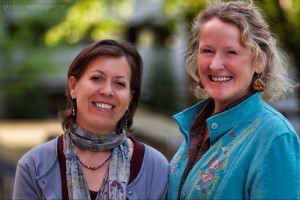
SANDRA BARDSLEY: Absolutely. That is extremely important. I like to think of the term neuroplasticity like an umbrella term. That it encompasses a whole ability of the brain to change neuropathways all of the time. So you’re not locked into, okay, that you’re doomed. You didn’t do this and therefore, you are doomed. It isn’t so much of what you didn’t do, it is more of what you did do. In the sense, I have worked diligently to show my baby that I love my baby and I have worked hard to make certain that the baby is going to have the most gentle birth that it can have. And then all of a sudden something happens that the baby gets into danger and the birth becomes very complicated and you end up having nothing of what you had planned in your head. That does not mean that the baby now is doomed, nor are you a failure. It has to do instead with the changes in the behavior and the environment and the neuro process that occurs that changes the whole concept of how the brain accepts and organizes itself and it forms new neuro pathways.
As long as that baby and you receive the support that you need at the point that you need it, then the brain is very plastic is how I say it. It is an umbrella term. It encompasses that plasticity. That the ability for you and me and the baby to move ourselves into a more holistic or more complete feeling of okay I am alright. We experience that in our lives all the time. When we are placed in a situation where something we’ve planned it all out and then it doesn’t go the way we want it to go or the way we thought it was going to go and yet things are brought into a perspective that we can heal the trauma, whatever it is. That is what neuroplasticity means. It is the capacity of that nervous system to develop a new neural connection, a new way of looking at what is happening. So there is no such thing as fault. You didn’t do it, so therefore you are doomed. There is no way that is true and that is the whole point of the nature versus nurture. Meaning, in the past, nature said, well you have these many cells and they turn on or turn off at certain times. What neuroplasticity is saying is that nature has the ability to implode upon those cells and they don’t turn on or turn off, it is not just an automatic thing. It has to do with the nurturing that has to be there.
LISA REAGAN: Yes.
SANDRA BARDSLEY: So let’s take, for instance, a baby that was born and left and abandoned and had to grow up let’s say in an orphanage and was never receiving the kind of love and protection that it needed. It was just receiving daily care. You and I know of people who even in history books who have gone through similar experiences like that and have come out of and made something tremendous out of themselves. That has to do with the neuroplasticity of the brain. They’re not locked into the negatives that happened at their birth or in their early childhood or you even know people who have had really difficult lives within their own lives and they’re not locked into it. They are affected by it and so therefore they need to look at it.
That is one of the things that APPPAH helps people do. That is what our studies and our work does. It is very interesting and very illuminating to have an opportunity to come to an APPPAH conference or a regional conference of APPPAH because you will find people who are talking about and working with these very concepts from the scientific all the way up through the social and psychological and there are lots of midwives and doulas who come because we want to learn more about how to be supportive to the unborn baby and the newborn baby.
LISA REAGAN: You mentioned APPPAH’s new educational program and I think it’s a real testament to the venerable status of APPPAH and its founders’ pioneering work, that you now offer a curriculum for professionals and parents that helps them to make this transition into this new science and paradigm with the full resources of the internet — including all of the awesome interviews that we do here at Kindred with Kate White. We enjoy our Pioneering Partnership with APPPAH. But this opportunity for impact seems to really be getting traction with this professional program. So can you tell me a little bit about what you find in that curriculum?
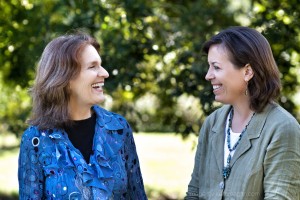
SANDRA BARDSLEY: Okay, first of all, two years ago APPPAH announced this program for professionals and for parents. It is an 11 module online course. We specifically made it so that there are two tracks to it. One is that, let’s say you are a professional and you want to incorporate it more into your practice, you then would probably want to take the full 11 modules. But let’s say you’re a prospective parent. You may only want to take three of those modules.
There are professional mentors that every student is assigned when they come onto the program and that mentor’s responsibility and the student’s responsibility are to connect and to answer questions and help with support. We have now 100 students all around the world from India to Australia, Europe, all over, and then here in the United States. It is quite exciting. Kate White is our administrator of that program and of the education department and she is doing a tremendous job. There is a monthly online call meeting that the students come on to, those who would like to.
So there is not only the certification program that they are taking but if they want they can also buy additional professional packets that they can study from. The whole purpose of all of these educational things that we are working on is to get the information out to parents and young professionals who are striving to include this into their work.
We also have the professional journal that comes out and many universities subscribe to that journal and so young students who are studying psychology and any kind of things having to do with infant development or childhood development have the opportunity to study from those professional journals. There is also a newsletter that is sent out quarterly and then there is our wonderful conferences.
We have not only regional conferences on the even year, so that would be like 2016, but before that, in 2015, is our international congress and it is a very nice large congress and we do our best to involve both the science aspect as well as the psych/social aspect and it is a wonderful opportunity for people to come. We invite anybody, parents and anybody to find out. If they go onto the website and watch, they will see who is going to be speaking in 2015. It is being held this year in Berkley at the Berkley Marina at the Doubletree. It is not only a lovely setting, but I think the program is coming together very nicely and I am excited about what is going to be offered to those who come. So we invite those who want to come.
LISA REAGAN: So tell me about the flying geese analogy.
SANDRA BARDSLEY: That’s right. The other thing that APPPAH is doing very diligently is working on what we call cobranding and that means that we working to reach out to pull all of us together that are working on birth issues like the major childbirth education groups, Lamaze, and Kapaa, DONA, and the midwifery organizations, and then we are starting a physicians guild. We have had several physicians who have come over the years to APPPAH and we are grouping them together to strengthen one another.
Because it is not easy in our society to change some of the patterns that have been there forever so to speak. We want to help make birth more gentle. So the geese analogy is that we are working in APPPAH to align ourselves with other organizations that are working on these issues and the wonderful thing about the geese story is that if you have ever noticed geese flying, they always fly in that v, or pretty much fly in that V pattern. There is a lead goose and a couple of either side and then they are following very closely behind one another.
The reason that they’re doing that and bicycle riders can tell you the same thing, they get an up drift from the person right in front of them. So the geese are flying together in that pattern because it strengthens one another and they get more, I guess you would say, speed, or strength from the birds right in front of them or right behind them, pushing them along and helping them along. Using that analogy, I think it is extremely important for us to realize that we work together.
I have been this field of childbirth education and working on birth activism issues since the 1960s and as a result, I have the opportunity of watching us grow together. The other thing that is neat about the geese analogy is that whenever a goose is hurt, let’s say that one got shot and it falls out of the lineup, two of the geese lie down with it, and they stay with that goose until it either dies or becomes well enough to join up with another group and they all come back in the pack together. That kind of symbolism is something that I love a whole lot because it means that we care for another. Not only do we care for babies and mothers and fathers and families, but we care for one another as professionals who are working with those people. So that is the geese analogy.
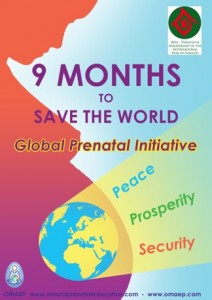
LISA REAGAN: APPPAH’s outreach program is how you are able to reach parents, professionals, organizations, and then this year you were visible on a global stage at the United Nations.
SANDRA BARDSLEY: Yes, absolutely, yes. There are three major organizations around the world and there are others I am sure. That is, OMAEP which is a French organization, which is a worldwide organization of prenatal educational association. There is ISPPM which is a German based organization, European based organization, dealing also with prenatal education, and then there is APPPAH. The three of us have become partners and are working through the UN with OMAEP leading us.
But we spoke at the UN with OMAEP in March and Thomas Verney who was our first president and co-founder spoke at the UN in March. That is one of the other areas that we are really focusing on because we want this information to get out to the world.
LISA REAGAN: That is fantastic. The reach and the planning and the maturity of APPPAH speaks so much to the fact that there is a conscious parenting movement and that there is a coherence and visibility that is emerging.
Thank you so much for sharing this incredible work that you’re doing at APPPAH and for laying it all out there, all of the many opportunities that now exist for parents and professionals to become involved and to support APPPAH. I will just say again, that is birthpsychology.com. The program you can find at birthpsychologyedu.com.
SANDRA BARDSLEY: That’s right.
LISA REAGAN: Both websites are full of information, very rich resources there. Thank you so much for coming on today and talking with us about APPPAH. I look forward to our continued relationship with APPPAH at Kindred. We have a number of articles and video interviews on our website, kindredmedia.org. We enjoy featuring your work and your message.
SANDRA BARDSLEY: Thank you so much, Lisa. It has been a pleasure and I really am so happy that we’re getting this message out to parents because we do want to be supportive to parents. We want them to know that we are here and we are here to help them. So thanks again for this opportunity.


